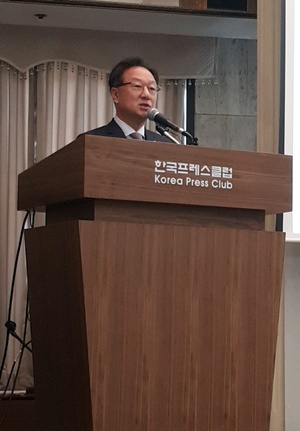Kolon Life Science remained confident that the regulator would not nullify its arthritis injection Invossa-K, which was recently revealed to have contained cancerous GP2-293 cells.
The company promised to fully cooperate for the investigation of the Ministry of Food and Drug Safety (MFDS).

Kolon Life Science CEO Lee Woo-suk reiterated Invossa’s safety at a news conference at S Tower in central Seoul, Thursday.
“The issue will not exacerbate to a degree where the authorities revoke the license,” Lee said. “We hope that the regulator will order a change in approval condition. As the matter has become a serious social issue, the ministry is expected to demand us to submit various data.”
The MFDS warned that its investigation into the safety of Invossa would be intense. The regulator will verify whether the 293 cells, derived from the kidney for the production of retroviruses, have been mistakenly mixed in the injection, and when it occurred. The ministry will decide a level of administrative punishment depending on the results.
Lee vowed to disclose all the available data to the ministry to fully cooperate with the probe. “The MFDS will take a conservative stance, as it should. I totally understand about their stance. I will open all data and materials, not to allow any piece of suspicion,” he said.
As for the investigation on Kolon TissueGene based in the U.S., the company will also provide all the materials for the U.S. Food and Drug Administration transparently, Lee noted.
“For us to survive, we should open all the data and actively cooperate with the authorities to get the drug’s safety verified,” he added.
According to Lee, the results of the company’s analysis on the working cell bank produced for sale in Korea and its mater cell bank will be delivered to the MFDS on April 15.
Separately, the MFDS has requested Kolon Life Science to submit Kolon TissueGene’s MSC cells to analyze them.
Kolon Life Science said it was discussing with FDA official-turned consultants to resume the development of Invossa in the U.S. The company tentatively suspended the phase-3 trials in the U.S. after learning that Invossa’s one of the cell ingredients has been mislabeled.
Kolon hopes to resume the trials after preparing additional data as requested by the FDA for the resumption of the study.
Lee mentioned an example of an American biotech company which quickly resumed a clinical trial after experiencing a similar mishap. “Among similar cases, there was a case where the suspension of the trial was easily lifted. We’re referencing the case and discussing it,” Lee said.
He also mentioned about a chance of 293 cells-containing Invossa’s winning approval in the U.S.
“I should be careful mentioning this because we’re still discussing it with consultants who are former FDA officials. However, none of them said Invossa would fail to get the nod just because it contained 293 cells,” Lee said. “One of their opinions was that the FDA focuses more on how safe the drug is, rather than finding a reason not to approve.”
For Kolon Life Science, the best scenario will be receiving an order to change approval conditions for Invossa and resume the drug sale.
The worst could be getting the license nullified, which would kick out the nation’s first gene therapy in just two years after the market release. In this case, the repercussion will be severe because it would damage Kolon’s license-out deals with partner firms overseas.

